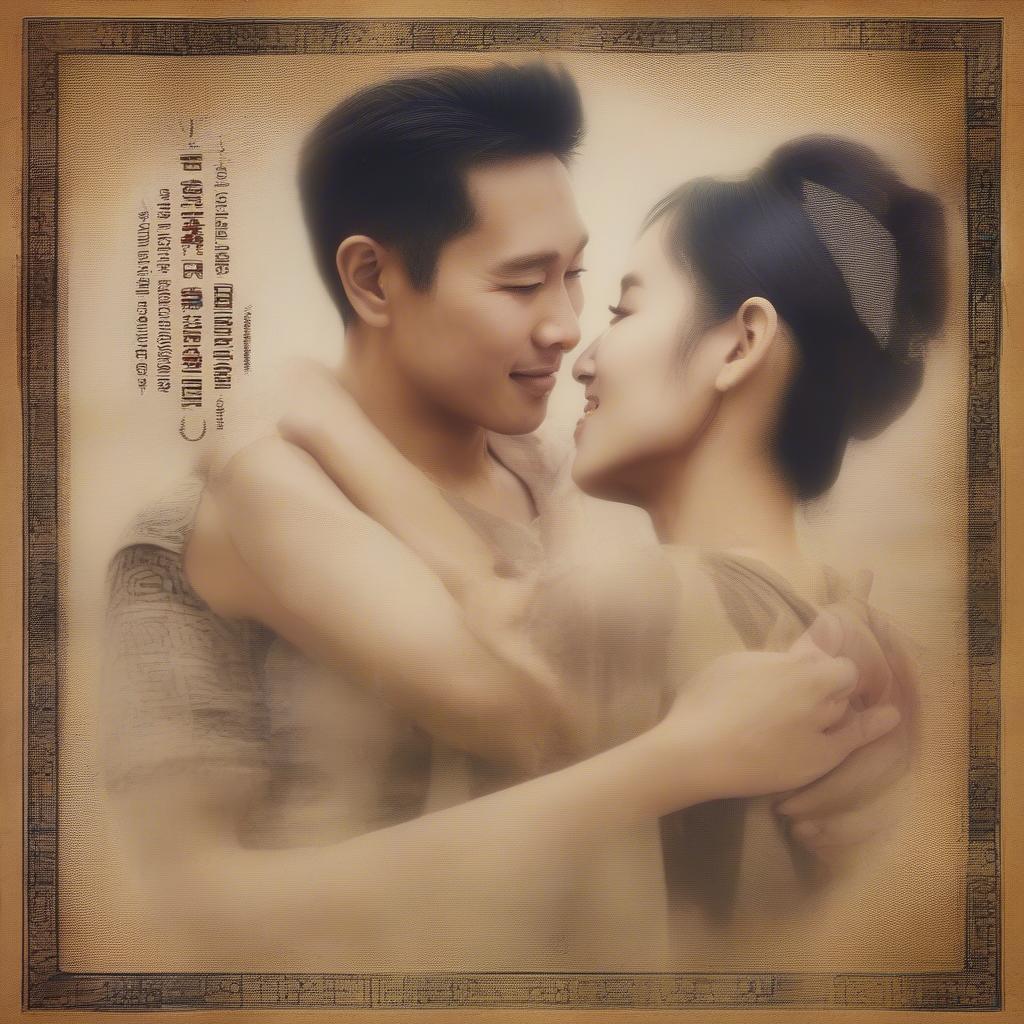Learning to say “I love you” in Thai can be a beautiful way to express your feelings to someone special. Whether you’re planning a trip to Thailand, connecting with Thai friends, or simply expanding your language skills, knowing this phrase can deepen your connection with Thai culture and the people you care about. This article will guide you through various ways to express love and affection in Thai, along with important cultural considerations.
Different Ways to Say I Love You in Thai
There are several ways to express love in Thai, each with its own nuances and levels of formality. Let’s explore the most common phrases.
The Classic “I Love You”: ผมรักคุณ (Phom Rak Khun)
The most direct translation of “I love you” in Thai is ผมรักคุณ (Phom Rak Khun). ผม (Phom) means “I” (masculine), รัก (Rak) means “love,” and คุณ (Khun) means “you.” This phrase is generally used in romantic contexts.
For Women: ฉันรักคุณ (Chan Rak Khun)
Women typically use ฉัน (Chan) instead of ผม (Phom) for “I.” So, “I love you” spoken by a woman is ฉันรักคุณ (Chan Rak Khun).
Expressing Love Casually: รักนะ (Rak Na)
For closer relationships, you can use the more casual รักนะ (Rak Na). This phrase is often used between close friends, family members, or romantic partners. The word นะ (Na) adds a sense of informality and endearment.
Saying “I Like You”: ผมชอบคุณ (Phom Chop Khun) / ฉันชอบคุณ (Chan Chop Khun)
If you’re not quite ready to say “I love you,” you can express affection with ผมชอบคุณ (Phom Chop Khun) or ฉันชอบคุณ (Chan Chop Khun), which means “I like you.” ชอบ (Chop) means “like.”
 Couple Saying I Love You in Thai
Couple Saying I Love You in Thai
Cultural Considerations When Expressing Love in Thailand
While expressing love is universally understood, cultural nuances play a significant role in how affections are displayed in Thailand. Public displays of affection are generally less common than in Western cultures. Holding hands is acceptable, but passionate kissing is usually reserved for private settings.
Respect and Politeness in Thai Culture
Thai culture emphasizes respect and politeness. Using proper pronouns like คุณ (Khun) when addressing someone you’re not close to is essential. For older individuals or those in positions of authority, using respectful titles is crucial.
Gift-Giving as an Expression of Affection
Gift-giving is a common way to express affection in Thailand. Small, thoughtful gifts can be a way to show you care without necessarily verbalizing your feelings.
Beyond “I Love You”: Other Ways to Show Affection in Thai
Beyond the direct translation of “I love you,” there are other phrases and actions that can communicate your feelings in Thai. These include expressing care and concern for their well-being, offering help and support, and showing genuine interest in their lives.
 Thai Family Showing Affection
Thai Family Showing Affection
How to Practice Saying “I Love You” in Thai
Practice makes perfect! Listening to native speakers and repeating the phrases aloud will help you improve your pronunciation and fluency. Online resources, language learning apps, and language exchange partners can be valuable tools in your language learning journey.
Conclusion: Expressing Love Authentically in Thai
Learning to say “I love you in thai language” is a meaningful gesture that can strengthen your relationships and enhance your understanding of Thai culture. Whether you choose the classic “Phom Rak Khun” or a more casual expression, expressing your feelings with sincerity and respect will always be appreciated.
FAQ
-
What is the most common way to say “I love you” in Thai? The most common way is ผมรักคุณ (Phom Rak Khun) for men and ฉันรักคุณ (Chan Rak Khun) for women.
-
Is it okay to say “I love you” to a friend in Thailand? Using รักนะ (Rak Na) is more appropriate for close friends.
-
Are public displays of affection common in Thailand? Public displays of affection are generally less common in Thailand than in some Western cultures.
-
What are some other ways to show affection in Thai culture? Showing care and concern, offering help, and giving thoughtful gifts are all ways to express affection.
-
How can I improve my pronunciation of Thai phrases? Practicing with native speakers, online resources, and language learning apps can help.
 Learning Thai Online
Learning Thai Online
Have more questions? Check out our other articles on Thai language and culture on DaiDuongTranhBa!
Need personalized advice? Contact us at contact@daiduongtranhba.com or visit our office at Michigan Ave, Suite 3100, Chicago, IL 60611, USA. Our 24/7 customer service team is ready to assist you.


